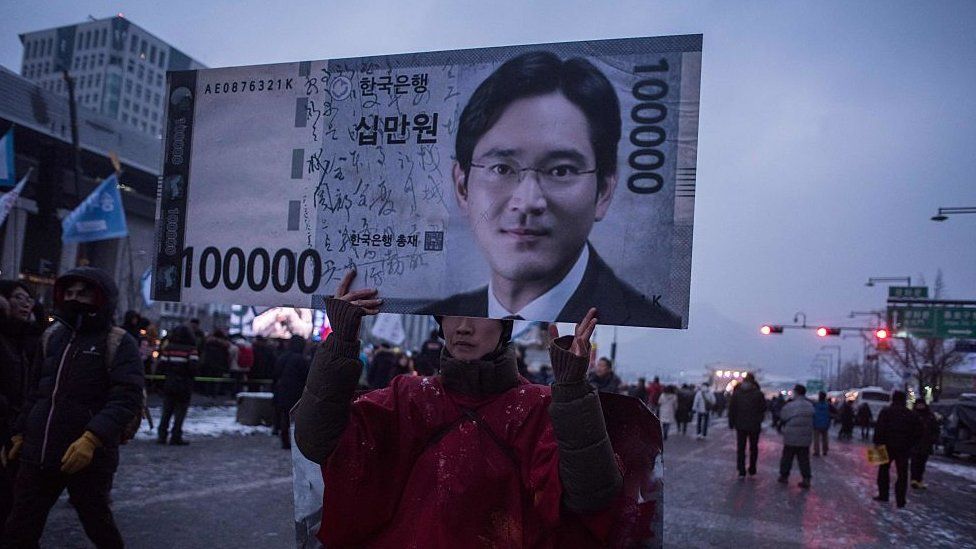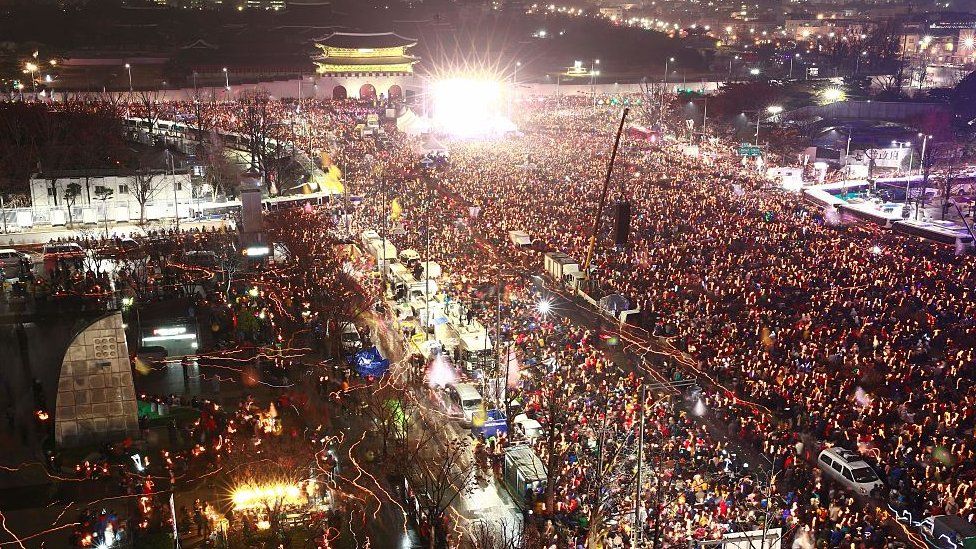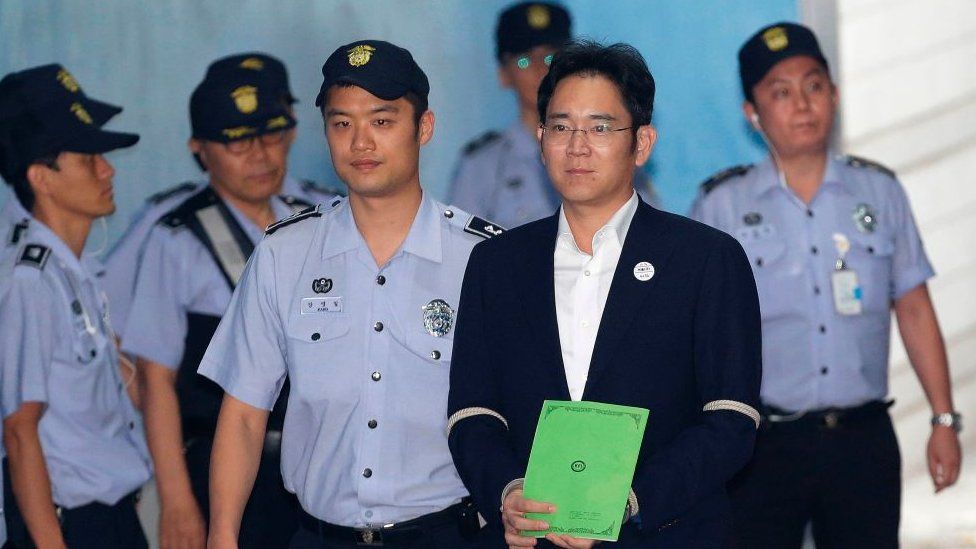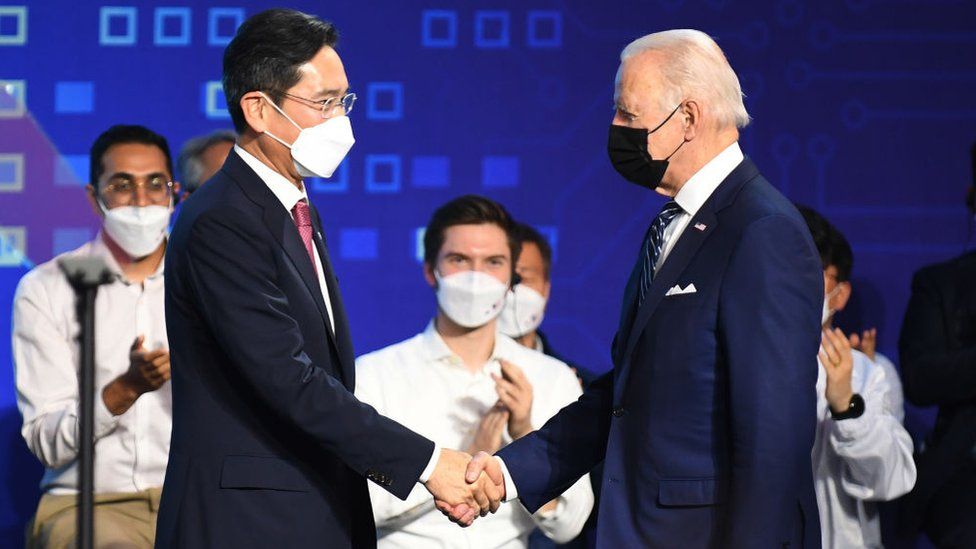



Protesters had once focused on Samsung heir Lee Jae-yong in anti-corruption demonstrations
One of South Korea's most powerful white collar criminals, Lee was twice imprisoned for bribing a former president.
South Korea's government justified the move, saying the de-facto leader of the country's biggest company was needed back at the helm to spearhead economic recovery post-pandemic.
This marks another swing in a struggle over how the country is run that has raged since mass protests took over Seoul six years ago and ousted a president from office.
Lee's crimes were directly tied up in the corruption scandal that led to the imprisonment of former president Park Geun-Hye, in office from 2013-2017.
The "Crown Prince of Samsung" - as he was dubbed by protesters - paid $8 million (£6.6m) in bribes to President Park and her associate to secure support for a merger opposed by shareholders that would shore up his control of his family's empire.
When it was revealed, millions of South Koreans turned out at candlelit protests every weekend in the 2016/2017 winter, demanding an end to Park's government and the stitch-up between politics and business.

Millions of people attended the protests against President Park and her corruption
Korea's parliament impeached Park and she was imprisoned in 2017 for 25 years.
Lee, who is also known as Jay Y Lee in the West, was jailed a year later for offences including embezzling company funds to buy a $800,000 (£650,000) horse for the president's friend's daughter.
A new president, Moon Jae-in swept into office with a mandate to clean up the mess. But he failed to make much headway. In his last days as president, he granted a pardon to his predecessor.
Now eight months later, under another new president, Samsung's chief has also received the same clemency.
For those who have been fighting against corruption, it's a dispiriting blow.
"It is a setback. And it means Korea retreats to the time before the candlelit demonstrations," said Sangin Park, an economics and industrial policy professor at Seoul National University.
Lee's case reaffirms popular conception that business leaders are untouchable and above the law.
In Korea, giant conglomerates dominate the economy, with the top 10 accounting for about 80% of GDP. Known as chaebols, they are family-controlled empires which provide a span of services. LG, Hyundai, Lotte, and SK are among them.
But Samsung is the biggest and most powerful of them all.

Lee was first jailed for bribery and corruption in 2017 - but then was later released from jail twice.
As the world's largest smartphone maker, it's a global electronics brand. But at home it does much more - hospitals, hotels, insurance plans, billboards even runs shipyards and theme parks.
Samsung and other chaebols are so omnipresent they're known as "octopus" firms, says Prof YoonKyung Lee, a political sociologist at the University of Toronto.
And those tentacles have long wormed their way into the highest levels of Korean politics. Prof Lee was at the 2016 protests and says most of the anger was directed at President Park's personal actions. But she said labour activists and others strove to highlight the chaebols' outsize influence on government.
Chaebols were heavily supported by the government after the Korean War. They were given cheaper electricity and tax incentives, there was a "Buy-Korea" policy and even help in suppressing union movements.
But the resulting monopolies also crushed competition, stifled labour movements and their practices spawned decades of bribery and corruption cases.
In many cases, Prof Lee said, executives were given light or suspended sentences. In some cases judges said the economy might suffer if a chaebol leader was taken out of action.
Mr Lee's own father, Lee Kun-hee was convicted of bribery and fraud in the 1990s when he was Samsung chairman. But he didn't serve a single day of jail time.
So in 2017, when his son was hauled away to a cell on a five-year sentence, activists hoped the case would mark a turning point.
Celebration however was short lived. Lee's court battle dragged on for years with twists and turns worthy of the most dramatic Korean serials.
An appeals court released him, a higher court then ordered a retrial at which he was again found guilty and jailed.
But just a few months into his second jail term, the Moon government released him on parole, saying it was in the national interest.
Since then, he has returned as the public face of Samsung - in May greeting US President Joe Biden on a trade visit to South Korea.

Lee has largely resumed his public duties as a Samsung executive, meeting with the US leader in Seoul in May
Lee still faces criminal allegations - of rigging company valuations, accounting fraud and making Samsung business decisions in breach of his sentence conditions. Clemency means he will be able to fully resume his executive responsibilities.
It follows a pattern of convicted chaebol leaders having their slates wiped clean.
"When it comes to formal power, there's the president's office and the National Assembly [legislature] - they're making the laws," Prof Lee said,
"But when it comes to political influence or cultural influence or even how people think about the importance of chaebol in Korean society, it's really down to a coalition of conservative political and business elites who all have interests with each other."
The government's pardon of Lee rests on the argument that chaebol leaders are needed for the economy. But numerous economists have pointed out this isn't backed up by hard proof.
"The pardoning of chaebol controllers has not contributed to economic growth or turnaround historically," said Prof Park.
Analysts say Samsung has fared perfectly well while Lee has been in and out of prison. Reform advocates say South Korea also needs to end its dependence on chaebols, where growth has been slowing for years.
"Several studies have shown that it's getting harder to get the 'trickle-down effect' - it's time to move away from the old notion that any illegal acts done by chaebols are 'forgivable' if they do their jobs," says Roh Jong-Hwa, a a lawyer from an advocacy group Solidarity for Economic Reform.
Still the dismay among critics over Lee's pardoning is not shared among the broader South Korean public. A recent public poll recorded 70% support for the pardon.
How to explain that support?
The desire to tackle corruption and chaebol influence remains, experts say. But it is mingled with fear and concerns over a looming recession - and residual pride over Samsung representing Korea on the world stage.
"There's a core belief that if Samsung does well, Korea does well. And Koreans have lived with this myth for so many decades, it's really hard for ordinary citizens to break of out it," says Prof Lee.
"Right now, amid an economic downturn, people want to see some concrete sign that we are moving forward and Lee's release is a sign of that."
-- Courtesy of BBC Sport